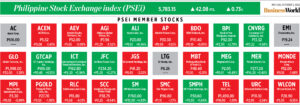ASEAN financial integration to boost Philippine growth

FINANCIAL INTEGRATION in the Association of Southeast Asian Nations (ASEAN) region could boost economic growth in the Philippines by about 3.5 percentage points (ppts), the International Monetary Fund (IMF) said.
In a September 2023 working paper, the IMF Asia and Pacific Department economists said boosting trade and financial integration among ASEAN-5 members may enhance the region’s resilience against global headwinds.
“While all countries have potential gains from financial integration, Indonesia, and the Philippines, which have the lowest level of financial development, would gain more with an average growth impact of about 3.5 ppts,” it said.
The ASEAN-5 region includes the Philippines, Indonesia, Malaysia, Singapore and Thailand. Financial integration is where financial markets in regional or global economies are closely linked together.
According to the IMF, the region has made little progress on financial integration due to regulatory and institutional constraints.
The IMF said digitalization can support regional integration as this could help firms, especially small and medium enterprises, take part in global value chains.
“Further, digitalization can also help countries raise the value chain by the production of more sophisticated products,” the IMF said.
However, the Philippines still has room to improve on its digital competitiveness compared with the rest of its ASEAN neighbors.
“Indonesia and the Philippines have room to improve on various dimensions including IT (information technology) integration, training and education, talent, and regulatory framework,” the IMF said.
The multilateral lender also recognized the ongoing cross-border payment initiatives in the region, where economies link domestic instant payment systems with another country.
“Cross-border payment initiatives could contribute to financial integration in the region through an enhanced financial flow across borders and improved regional interconnectivity,” the IMF said.
This includes the tripartite cross-border payment agreement between the Philippines, Malaysia, and Singapore through BancNet, Inc., which have been under discussion for implementation.
In June 2022, BancNet President Fabian S. Dee said the operator is exploring how to facilitate cross-border payments. It is also collaborating with the Bangko Sentral ng Pilipinas (BSP), the Philippine Payments Management, Inc., and InstaPay Automated Clearing House.
However, the IMF said ASEAN economies should be careful not to compromise financial stability, as financial integration may pose some risks and challenges.
“Efforts toward more financial openness should be preceded by strong macroeconomic fundamentals and efforts to increase the resilience of domestic financial systems, including through enhanced information sharing, surveillance and crisis management, and a regional safety net,” it said.
The IMF said a gradual approach in promoting more regional integration would be appropriate to maximize benefits while minimizing risks.
“Pursuing greater integration with the ASEAN-5 region could help build a layer of resilience for countries in the region, which would prove useful in a shock-prone global economy that is in the midst of policy-induced reversal of globalization reflected by heightened geoeconomic fragmentation risks,” the IMF added.
In November last year, the BSP signed a cooperation pact with other central banks in ASEAN to strengthen collaboration on payment connectivity.
The MoU on Cooperation in Regional Payment Connectivity was signed with the Bank of Indonesia, Bank Negara Malaysia, Monetary Authority of Singapore, Bank of Thailand, and the State Bank of Vietnam.
The cooperation includes several modalities, including QR-code and fast-payment based cross-border payments.
To further strengthen the gains from financial integration, the IMF recommended trade liberalization in the region, improving regulatory and institutional quality, as well as reducing restrictions on capital flows.
Meanwhile, regional trade integration can also be strengthened within ASEAN, the IMF said.
“Non-tariff barriers should be reduced in line with the Non-Tariff Measures (NTM) Guidelines, including through improved notification and stronger discipline in simplifying and harmonizing rules and regulations impacting trade,” it said.
Facilitating more free trade agreements, eliminating non-tariff barriers, strengthening global value chains, and boosting digitalization to facilitate cross-border e-commerce, are a few ways to boost regional trade integration, it added.
The IMF working paper was written by Nuri Baek, Kaustubh Chahande, Kodjovi M. Eklou, Tidiane Kinda, Vatsal Nahata, Umang Rawat, and Ara Stepanyan. — Keisha B. Ta-asan




